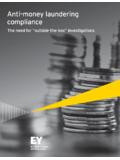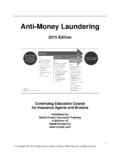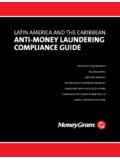Transcription of Money Laundering Risks and E-Gaming: an Overview
1 Money Laundering Risks AND E- gaming : A EUROPEAN Overview AND ASSESSMENT. Final Report Michael Levi, , (Econ.). Professor of Criminology Cardiff School of Social Sciences Cardiff University Wales, UK. September 2009. 2. CONTENTS. Acknowledgements .. 3. Executive Summary .. 4. Areas of Risk .. 4. Efforts to combat Money - Laundering .. 5. Conclusions .. 6. 1. Introduction .. 7. What is Money - Laundering ? .. 7. 2. Risks and Threats in Money - Laundering and e- gaming .. 8. E- gaming in Europe: the Economic Context.
2 10. Money - Laundering Techniques .. 11. Literature review of Money Laundering in e- gaming .. 12. Areas of Money - Laundering Risk .. 14. 3. Counter-measures against Fraud and Money - Laundering in the Regulated e- gaming Sector .. 19. Money Laundering controls in the online gaming industry .. 19. Know Your Customer (KYC).. 21. Comparison with other sectors .. 22. 4. Assessing Compliance of the e- gaming Sector with AML Efforts .. 24. Reporting of Suspicious Transactions .. 24. Conclusions .. 25. References .. 27.
3 Annex 1 The FATF Report on Casinos (2008) .. 28. 3. ACKNOWLEDGEMENTS. I am grateful to the European gaming and Betting Association, especially Florian Cartoux, for their support for this project; to the compliance officers, payment card experts, police, professional gamblers, regulators and UK. Payments staff who gave of their expertise and time, and commented on earlier drafts; and to Michael Gold for his research assistance. Michael Levi is currently funded by a UK Economic and Social Research Council Professorial Fellowship (RES- 051-27 0208).
4 4. EXECUTIVE SUMMARY. This report reviews the threat that Money Laundering through the e- gaming industry presents and could plausibly present to society, and the ways in which the regulated e- gaming industry discharges its duty to reduce Money Laundering in the EU. Industry representatives interviewed agree that there can be leakage'. through which launderers may move some proceeds of some crimes, though the Risks associated with the sector are comparatively modest, due to the high traceability of e- gaming transactions and the customer identification controls in the regulated sector.
5 However this report suggests that it is not a realistic policy goal for governments in a free society to eliminate Money Laundering Risks altogether: the aim should be to reduce to a tolerable level the risk that e- gaming may assist other crimes. This is done in two ways: controls over ownership; and controls over the operation of e- gaming itself. One reason to prefer regulation over prohibition is to ensure that operators have to undergo a fit and proper person' test before receiving a licence, preventing people with links to organised crime and terrorist groups from owning what could be vehicles for Laundering if there were no controls or if controls were over-ridden by powerful managers or 1.
6 Beneficial owners. The second reason is to encourage e- gaming companies to develop a set of procedures approved by regulators to reduce integrity Risks . One question raised in this review is how plausible it is that a significant amount of this total Laundering in the billions of Euros - would occur via e- gaming . E- gaming (as contrasted with land-based forms of gambling). does not directly feature significantly, or indeed at all, in the recent published threat assessments of Europol and other European policing organisations, or in their policing priorities.
7 To date, generalised and understandable expressions of concerns by Europol and by the Financial Action Task Force about Money Laundering Risks posed by the Internet have not been accompanied by evidence of significant Laundering via e- gaming . AREAS OF RISK. 1. Online gaming firms can credit winnings or unused funds back to an account other than the one on which the original bet was made: an issue which gaming firms share with other business areas. 2. The use of front people' through whom to run gaming transactions.
8 3. Peer to peer games, where value transfers can occur between both electronic and human players as a result of deliberate losses, at a relatively low cost to the players. 4. Payment in (and out) via other financial intermediaries which are regulated for AML purposes but where Know Your Customer is of modest or variable quality. The corrupt fixing' of sports results or individual events on which betting takes place, generating fraud and proceeds of crime, is sometimes considered to be Money Laundering . However this is the making of a dishonest profit rather than hiding and transforming the proceeds of crimes that have been committed in the community.
9 Likewise, identity fraudsters can use financial instruments they have acquired to gamble for pleasure and to transfer modest sums to other media: but this is more fraud than it is Money Laundering . 1. A beneficial owner' is someone on whose behalf a company is run, whether or not they are listed on documents as the nominal owner. 5. EFFORTS TO COMBAT Money - Laundering . Online gaming companies licensed and regulated in the EU have chosen to comply with the Third EU Directive for the prevention of Money - Laundering which strictly speaking applies only to casinos within the gaming sector.
10 In addition, the regulated sector also subscribes to codes of conduct such as that of the European 2 3. gaming and Betting Association and the Remote Gambling Association. On-line gaming companies collect a significant amount of data on the IP addresses, gaming and gaming finance patterns of their customers, which are used to build up profiles against which to assess the Risks posed by particular customers. E- gaming firms vary in the extent to which they impose spending limits, and in general business sectors and financial services, this would be regarded as a purely business decision, unless their solvency was threatened, which in this case would be very unlikely.




